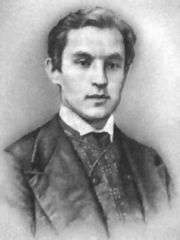Evgeny Markov (writer)
| Evgeny Markov | |
|---|---|
 | |
| Born |
Марков Евгений Львович October 8, 1835 Kursk Governorate, Imperial Russia |
| Died |
March 30, 1903 (aged 67) Voronezh, Imperial Russia |
| Occupation | writer, critic, ethnographer |
Evgeny Lvovich Markov (Russian: Евгений Львович Марков, 8 October 1835, Shchigrovski region, Kursk Governorate, Imperial Russia, — 30 March 1903, Voronezh, Imperial Russia) was a Russian writer, critic and ethnographer.
Originally a liberal author who contributed to Otechestvennye Zapiski, Delo and Vestnik Evropy among other magazines, Evgeny Markov gradually drifted towards the conservative camp, became part of the Slavophile movement and gained notoriety by being arguably the fiercest critic of Nikolai Nekrasov.[1][2]
Markov's major novel, Black Earth Field (Черноземное поле, 1878), eulogized the simple, close-to-nature life of an idealized, well-cultured Russian landlord. Even more retrograde was his collection of autobiographical notes and sketches Barchuki (Барчуки, 1874), full of nostalgia for 'simple and quiet virtues' of the old Russia's serfdom.[2]
What stood the test of time better was his legacy of traveller sketches, notably the popular Sketches of Crimea (Очерки Крыма, 1872), as well as Sketches of Caucasus (Очерки Кавказа, 1887), Journey to the East (Путешествие на Восток, Vols. 1-2, 1890–1891), Russia in Central Asia (Россия в Средней Азии, 1901) and Journey Through Serbia and Montenegro (Путешествие по Сербии и Черногории, 1903).[1]
His younger son Nikolai Markov, was a Russian politician and publicist, one the leaders of the Black Hundred movement.[1]
References
- 1 2 3 "Марков, Евгений Львович". Brief Literary Encyclopedia in 9 volumes Vol. 4 // Краткая литературная энциклопедия в 9-ти томах. Государственное научное издательство "Советская энциклопедия", т.4, М., 1967. / The Moshkov Library. Retrieved 16 November 2015.
- 1 2 Klevensky, M. "Марков, Евгений Львович". The Soviet Literary Encyclopedia in 11 volumes. 1929–1939. Vol. 6. Sovetskaya Encyclopedia Publishers, 1932. Pp. 815-816 // «Литературная энциклопедия» М., 1929—1939. Т. 1—11. Retrieved 16 November 2015.